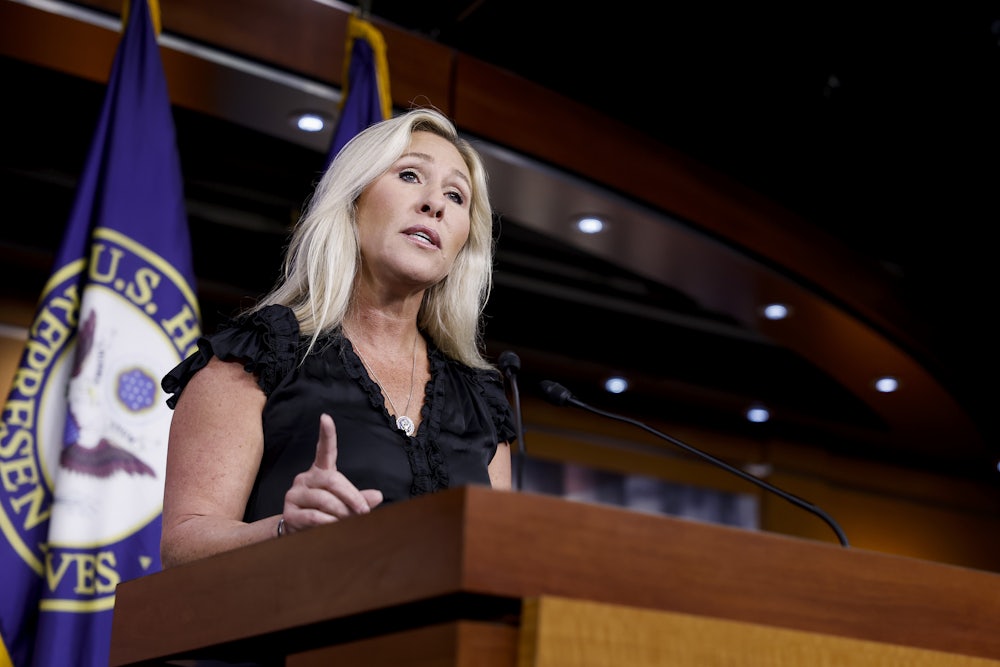Taking time out from less sympathetic causes—preventing the exercise of popular rights like abortion, policing who gets to use the bathroom, defending our freedom to be poisoned by our stoves—some American conservatives have acquired a surprisingly relatable obsession: saving the whales.
The New York Post reported in late April an “‘alarming’ surge in whale deaths as wind farms grow off New York and New Jersey.” Earlier this year, Marjorie Taylor Greene fueled panic on this subject on Sean Hannity’s Fox show, saying she didn’t know why “AOC isn’t … crying for the dead whales that keep washing up on the beach from wind farms that are being placed all over the ocean.” Greene said whales were “beaching themselves in record numbers” because of offshore wind power. And Tucker Carlson jumped on this “think of the cetaceans!” bandwagon before his ignominious departure from the network last month.
Now Politico is even suggesting that New Jersey Governor Phil Murphy’s wind plans and environmental legacy could be “on the line.” What’s going on here?
The good news is that when extreme right-wingers weaponize concern over whales and other wildlife to score propagandistic points, it shows that they realize that protecting wildlife is popular. This represents, in a limited sense, progress. The bad news, though, is that this narrative about wind energy harming wildlife is dangerously misleading. The major threat to marine wildlife is global warming, and renewable energy sources like wind power are among the most promising solutions to that problem.
In March, Republican congressmen Jeff Van Drew (New Jersey), Chris Smith (New Jersey), Scott Perry (Pennsylvania), and Andy Harris (Maryland) held a hearing on the issue on the Jersey Shore, where nine dead whales had recently washed up on beaches. The hearing was attended by more than 400 concerned citizens. Republicans in Congress even introduced a resolution calling for a moratorium on wind farms and, this month, wrote a letter to the General Accounting Office demanding further study of the matter.
The month before the hearing, hundreds convened at a rally to “Save the Whales” at Point Pleasant Beach on the Jersey Shore, bearing hand-lettered signs with slogans like “Stop Offshore Wind!” In some ways it looked like a left-wing environmental rally, with participants wearing fish-shaped hats and carrying signs warning of “mass whale extinction.”
Whales have not always been this beloved by the American right. During the 1980s, the environmentalist slogan “Save the Whales,” popularized by groups like Greenpeace, was mocked by conservatives and disaffected youth. “Nuke the Whales,” an ironic slogan from a punk rock song, rapidly became a country-rock band name and a widespread bumper sticker displayed all over the country with varying levels of sincerity (with an edgier variant, “Nuke a Gay Whale for Jesus,” as well as the ad feminam “Feed Jane Fonda to the Whales”). Princeton historian D. Graham Burnett called the bumper sticker “the epitaph for the two decades that get called ‘the sixties,’” arguing that it expressed the spirit of “America in the age of Reagan.” Another popular right-wing sendup of the Greenpeace cause—also expressed by a bumper sticker, since we did not have memes back then—was “Save the Whales, Collect a Whole Set.” Even well into this century, right-wing pundits were mocking liberals for wanting to “kill the babies, save the whales.”
Whales are beautiful, profoundly intelligent animals, and it’s great that conservatives want to save them. But while the whale deaths are awful, there is no evidence that the wind farms are causing them.
Experts say the spike in whale deaths predates the growth of offshore wind. Scientists, environmental groups, and state and national governments agree that whales are being killed, but not by wind turbines. Instead, the culprits are boats, fishing nets, and plastics. And one of the worst threats that whales now face is climate change—the problem that wind farms are intended to mitigate by helping the world move away from fossil fuels.
In fact, new data shows that the ocean is warming more drastically and more quickly than anyone realized. As the earth’s atmosphere heats because of global warming caused by fossil fuels, the ocean absorbs much more of the heat than land. This is already having disastrous consequences for underwater life, bleaching coral reefs, killing the plants upon which marine animals feed. Climate change affects where and when the plankton and fish that whales eat can thrive, a problem that scientists expect will make it harder for them to find food. Changes in ice patterns can complicate their migration: As mammals who need to surface for air periodically, whales run the risk of getting trapped under the ice. Climate change also intensifies pollution, raising the concentration of toxins in the ocean, which can suppress whales’ immune systems and also make it harder for the females to reproduce.
Despite that, some local environmental groups seem to have swallowed the narrative that wind energy may be killing whales. Cindy Zipf of New Jersey–based Clean Ocean Action testified in the March hearing that offshore wind energy was moving too fast, without enough assessment of the risks, calling the turbine development a “massive industrialization.” The panic taps into a certain left-wing Nimbyist environmentalism, in which no technological solution is ever good and every adaptation to a global problem must be rejected for hyperlocal reasons (seawalls may impinge on a park, and birds may fly into a windmill or solar panel).
If “wind energy kills whales” sounds like a story the fossil fuel industry would love, that’s because that sector is indeed behind it: Groups funded by the fossil fuel industry, like Heartland Institute and a group called—with classic nominative “Opposite Day” whimsy—the Committee for a Constructive Tomorrow, have been trying to sell the public on this narrative for years. On Earth Day, these groups helped fund a plane over the beaches in Atlantic City flying a banner that read, “SAVE-WHALES-STOP-WINDMILLS.ORG.” As part of a concerted fossil fuel industry backlash against the Inflation Reduction Act’s tax incentives for renewable energy, groups like Heartland are contributing to a deluge of disinformation on this subject.
The conservative embrace of animal conservation in recent years has some upsides: A $1.4 billion bipartisan bill called the Recovering America’s Wildlife Act, or RAWA, first attempted last year, was reintroduced in the Senate in March after passing the House, and enjoys bipartisan sponsorship and support. RAWA would fund state, local, and tribal conservation efforts for more than 12,000 species.
But the manipulative and mendacious Jersey Shore whale narrative doesn’t belong to this category of cooperation. The notion that wind power kills whales is a cleverly disingenuous trolling of the libs (so savvy that some progressives fall for it), exploiting people’s visceral love of large, wild animals—the scientific term is “charismatic megafauna”—and our profound collective grief over their deaths. The hoax mischaracterizes the real problems facing whales, making it more difficult for these amazing animals to get the abundant, livable ocean they need.










